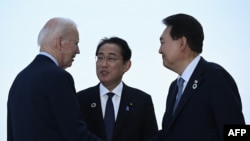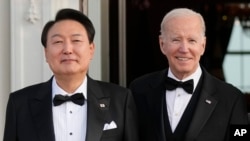미국이 다음 주 미한일 정상회의에서 북한뿐 아니라 중국을 겨냥한 안보협력 확대를 모색할 것이라고 전문가들은 전망했습니다. 대중관계 등을 고려해야 하는 한국의 입장이 관건이라는 지적도 나옵니다. 박형주 기자가 보도합니다.
국무부 출신인 토머스 신킨 애틀랜틱 카운슬 선임연구원은 이번 미한일 정상회의에서 중국 문제에 대해 정상 간의 진솔하고 진전된 논의가 이뤄질 것으로 전망했습니다.
[녹취: 신킨 연구원] "because China has been increasingly aggressive and assertive and in ways that are very negative for the political security and economic futures of the US, Korea and Japan. And so naturally there's going to be and should be a lot of discussion a very frank discussion about how to deal with that..."
갈수록 증가하는 중국의 공격적이고 강압적인 행위가 미국과 한국, 일본 모두의 정치 안보 경제에 매우 부정적인 영향을 미치는 만큼 이에 대한 대응 방안에 대해 매우 솔직한 논의가 있을 것이며, 그래야 한다는 것입니다.
또 신킨 연구원은 한반도 유사시 문제와 타이완해협의 분쟁은 같은 역내에서 동일한 행위자들이 관여하는 사안으로 "완전히 분리된 문제"가 아니라고 강조했습니다.
[녹취: 신킨 연구원] "we can't entirely assume that a Taiwan cross straight a crisis would be entirely decoupled from a korean peninsula crisis nor can we absolutely assume that a korean peninsula crisis would be completely separate from across Taiwan straits crisis because you know they're in the same region and they involve a lot of the same actors. After all a lot of us forces that are in the Republic of Korea might be involved in a conflict....in terms of how far president Yoon can go well I think he can go pretty far. It doesn't mean he has to announce"
특히 주한미군이 타이완해협 분쟁 시 관여할 수 있으며, 북한은 이 분쟁을 한국 침투의 기회로 판단할 수 있다는 것입니다.
신킨 연구원은 미한일은 이 두 사안을 분리해 접근해선 안 되며 타이완해협 위기 시나리오에 대해서도 논의해야 한다고 말했습니다.
그러면서 "윤석열 대통령이 이 문제와 관련해 상당히 전향적인 입장을 취할 수 있을 것"으로 생각한다며, 그렇다고 "그것을 공개적으로 발표할 필요는 없다"고 언급했습니다.
조 바이든 대통령은 오는 18일 워싱턴 DC 인근의 대통령 별장 캠프 데이비드에서 윤석열 대통령과 기시다 후미오 총리와 함께 3국 정상회의를 개최합니다.
3국 정부는 이번 정상회의에서 나온 결과를 공동성명 형태로 발표하는 방안을 협의 중인 것으로 알려졌습니다.
성명에는 고도화된 북한의 핵·미사일 위협에 대한 억제력 강화 방안이 담길 것으로 전망되는 가운데 타이완해협 문제를 비롯한 대중국 견제 메시지가 어떤 수준으로 포함될지도 관심사입니다.
게리 세이모어 전 백악관 대량살상무기 조정관은 이와 관련해 "미국은 무력 사용을 통해 타이완 현상유지를 변경하려는 어떠한 노력에 대해서도 반대한다는 문구가 성명에 포함되기 원할 것"이라고 말했습니다.
[녹취: 세이모어 전 조정관] "I think the US would like to have some language in the statement that would address opposition to any effort to change the status of Taiwan through the use of force. Now we know that Japan has agreed to similar language. I don't know whether how far Seoul is prepared to include language that talks about the Taiwan situation. In a way North Korea is easier because both Tokyo and Seoul have such a strong common interest in opposing any aggression by North Korea. China obviously is a more difficult issue especially from seoul's standpoint."
세이모어 전 조정관은 "일본은 이와 비슷한 문구에 동의해 왔다"면서 "그러나 한국이 이런 문구를 성명에 포함할 준비가 어느 정도 됐는지 불확실하다"고 말했습니다.
그러면서 "도쿄와 서울은 북한의 침략에 반대한다는 강력한 공통의 이해를 갖고 있기 때문에 북한 관련 문제는 어떤 면에서 (합의가) 더 쉽다"면서, 그러나 "서울 입장에서 중국 사안은 더 어려운 문제임이 분명하다"고 말했습니다.
지난해 11월 캄보디아 프놈펜에서 열린 미한일 3국 정상회의 이후 나온 공동성명에선 '중국'이라는 문구가 명시적으로 들어가지 않았습니다.
다만 "타이완해협에서의 평화와 안정 유지의 중요성"과 함께 "인도-태평양 수역에서의 그 어떤 일방적 현상 변경 시도에 강력히 반대한다"는 언급이 포함됐습니다.
지난 5월 윤석열 대통령의 워싱턴 국빈방문을 계기로 나온 공동성명도 중국 명시 없이 이같은 내용만을 거론했습니다.
그러나 지난 1월 미일 정상 공동성명에선 역내 도전으로 북한과 함께 "규칙 기반 국제질서에 어긋나는 중국의 행동"을 직접 거론했습니다.
로버트 랩슨 전 주한미국 대사대리는 7일 VOA에 "미국은 3국 협력, 특히 안보 분야에서 협력을 확대하고 공고히 하는 데 관심이 있으며 캠프 데이비드 정상회담을 이를 위한 특별한 기회가 될 것으로 보고 있다"며 이같이 말했습니다.
하지만 이번 캠프 데이비드 정상회의 관련 성명에서도 지난해 11월 '프놈펜 3자 공동성명'과 이후 양자 정상회담의 성명을 넘어선 수준의 언급이 담길 것으로 예상하지 않는다고 말했습니다.
미국은 북한은 물론 중국을 겨냥한 안보협력 강화를 바라지만 한국 정부가 이를 전적으로 지지하긴 쉽지 않을 것이라는 분석입니다.
[랩슨 전 대사대리] "The U.S., of course, is interested in expanding and enshrining trilateral cooperation, especially on the security side, and sees the Camp David summit as a unique opportunity and leverage to do that. President Yoon is sympathetic and supportive, but within certain limits. Undoubtedly, he would agree to reported US proposals to regularize stand-alone trilateral summits, and to expanding trilateral naval and air exercises, to include enhanced trilateral sharing of missile defense information and intelligence…provided the ostensible focus is on the NK threat. Measures beyond that, however, such as firm commitments to consult with Japan in event of an “attack” and “boots on the ground” training with Japanese ground forces - that may be suggestive of a de facto trilateral alliance - are more sensitive and would need to be assessed and carefully calibrated by Yoon and his national security team through the lens of both Chinese and domestic Korean political reactions."
랩슨 전 대사대리는 윤석열 대통령이 3국 단독 정상회의 정례화, 3국 해군·공군 훈련 확대, 미사일 방어 정보와 첩보 공유 강화 등 미국의 제안에 분명히 동의할 것이라면서도 "표면적인 초점이 북한 위협에 맞춰져 있을 때"라는 전제를 달았습니다.
하지만 "그 이상의 민감한 조치들은 윤석열 정부가 중국과 국내의 정치적 반응을 모두 고려해 조심스럽게 평가하고 조정해야 할 것"이라고 말했습니다.
'그 의상의 조치'들에 대해선 '공격' 시 일본과 협의하겠다는 확고한 약속과 사실상'3국 동맹'을 내포할 수 있는 일본 지상군과의 훈련 등을 거론했습니다.
랜드연구소의 제프리 호넝 선임연구원은 "윤석열 대통령이 전임자들에 비해 중국에 대해 더 회의적이고 경계하는 모습을 보이고 있다"고 평가했습니다.
또한 "윤석열 정부 출범 이후 미한일 사이의 공통분모가 더욱 늘었다"면서도 중국 문제에 대해선 여전히 온도차가 있다고 지적했습니다.
[녹취: 호넝 연구원] "I do think that president Yoon has shown that he does view China with more skepticism and caution than his predecessors. And so in some ways I think under president Yoon there has been a shift of more commonality between Tokyo, Seoul and Washington right now. Are they completely aligned? I don't know. I think it would be too much to say that Seoul is completely aligned and sees China the same way that Japan does. I don't get that sense that they do. I think this is a limitation because historically Japan is much more closer aligned to United States strategic thinking on China than South Korea is.”
중국 문제에 대해 3국이 완전히 일치하는지 의문이며, 특히 한국이 일본과 같은 방식으로 중국을 본다고 단정할 수 없다는 것입니다.
호넝 연구원은 그러면서 "역사적으로 일본은 미국의 대중 전략에 대해 한국보다 훨씬 더 공조를 이루고 있다"고 말했습니다.
월러스 그렉슨 전 국방부 아시아태평양 담당 차관보는 중국 문제에 대한 미한일의 공조는 "한 번에 한 걸음씩" 즉 단계적 진전을 이루는 것이 현실적이라고 말했습니다.
[녹취: 그렉슨 전 차관보] "But one step at a time, one step at a time it may be yeah step by step. South Korea and Japan, have different relationships with China and they're much different than they are with North Korea. If we can get one, then that works. Maybe they'll get to an agreement on China."
한국과 일본의 대중 관계는 각각 다르며 북한 문제보다 더욱 차이가 크다는 것입니다.
따라서 북한 문제 등에서 먼저 공조를 이루고 이후 중국 문제에 대해서도 서로 합의를 이뤄나가는 방향을 그렉슨 전 차관보는 제시했습니다.
한편 신킨 연구원은 이번 미한일 정상회의에서 첨단 반도체 등 관련 기술의 중국 유입을 억제하는 방안을 비롯한 경제안보 영역에서 중국이 제기하는 위험 요소를 제거하는 이른바 '대중 디리스킹(De-risking)'에 대한 논의도 있을 것이라고 설명했습니다.
랩슨 전 대사대리는 3국 반도체 협력과 관련해 "미국은 한국과 일본이 직접적으로"경쟁을 도와주기를" 바라는 것이 아니라 첨단 반도체, 전기차 배터리, AI, 양자 등 주요 첨단 기술 분야에 대한 대중 제재 체제에 대한 양국의 강력한 지지를 원하고 있다"고 말했습니다.
[랩슨 전 대사대리] "As for trilateral semiconductor cooperation, the U.S. is not looking for Korea and Japan to “help it compete” directly, but rather wants both countries’ strong support with respect to the sanctions regime the U.S. is imposing against China’s key high tech sectors (eg., high-end semiconductors, EV batteries, AI, and quantum). Undoubtedly, Yoon will want to find a path forward that is supportive of US interests, but also protects and furthers the core interests of Korea’s flagship semiconductor sector, which at some level competes with Japan and the U.S.”
랩슨 전 대사대리는 한국은 "미국의 이익에 협조적이면서도 일본, 미국과 어느 정도 경쟁 관계에 있는 한국의 주력 반도체 부문의 핵심 이익을 보호하고 발전시킬 수 있는 길을 찾고자 할 것"이라고 말했습니다.
VOA 뉴스 박형주입니다.





